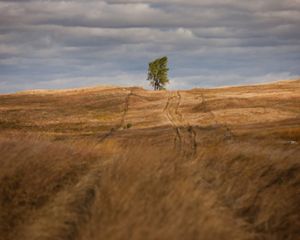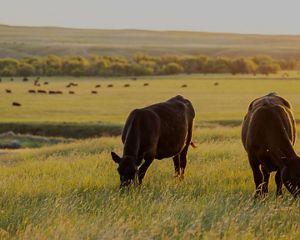
Well-managed grazing lands are the foundation of a thriving beef industry—and resilient ecosystems. These imperiled landscapes provide critical habitats, produce clean water, store carbon, and sustain rural communities. But to achieve meaningful impact, we must work with ranchers and land managers, as well as other key players in the beef industry to create systemic changes in the supply chain.
One approach TNC is pursuing is working with ranchers and industry leaders to establish certification and verification systems that create a transparent, sustainable beef supply chain in the United States.
Quote: Rob Manes
TNC is helping to establish certification and verification programs rooted in rigorous, science-based standards—covering environmental stewardship, animal health, worker safety and more—to support a beef supply chain that delivers verified sustainability from pasture to plate.
Why Certification Matters
Certification and verification programs rooted in science have the potential for scaling regenerative grazing practices because they create trust, accountability, and market incentives. Here’s why they matter:
-
Transparency and Consumer Confidence
Consumers increasingly demand proof that their food is produced sustainably. Certification provides evidence that beef comes from operations following regenerative principles, while verification ensures that this claim holds true from ranch to retail. This transparency builds trust and strengthens demand for sustainable beef.
-
Incentivizing Ranchers
Certification programs reward ranchers who invest in soil health, biodiversity, and water conservation. By linking these practices to market premiums and procurement standards, ranchers have a financial reason to adopt regenerative grazing, making it economically viable at large scales.
-
Supply Chain Alignment
The beef industry is complex, involving ranchers, feeders, processors, retailers, and food service companies. Certification and verification create a common framework for sustainability standards, enabling all stakeholders to align on regenerative goals and measure progress consistently.
-
Large-Scale Impact
When certification becomes embedded in corporate procurement policies and consumer expectations, it has the potential to transform regenerative grazing to a widespread mainstream standard. This is how an initiative that TNC participated in is currently influencing more 46 million grazing land acres.
Partnering for Verified Progress
TNC is committed to improving grazing land health by collaborating with ranchers and other beef supply chain players to strengthen certification and verification systems. Currently, the U.S. Department of Agriculture requires cattle traceability for disease monitoring and control, but only for a limited subset of cattle. This framework could be expanded to enable voluntary participation by ranchers who want financial benefits from value-added price premiums for verified sustainability attributes.
To accelerate this shift, TNC worked with Where Food Comes From—the largest commercial provider of certification and verification services to the livestock industry—to integrate environmental sustainability measures into the company’s CARE Certified standard. This program aligns beef production with regenerative principles and is verified by independent third-party reviewers to ensure optimal outcomes.
TNC is also working with other emerging private certification enterprises focused on regenerative grazing. While these initiatives are still building enrollment, they represent critical steps toward scaling credible, science-based regenerative grazing outcomes.
By expanding programs that prioritize rigorous, independent verification, this conservation–industry partnership can drive large-scale improvements in grazing land health across nearly a quarter-billion acres by 2030.
Certification and verification go beyond compliance—they create a framework that empowers every stakeholder in the beef supply chain to build healthier lands, stronger communities and a more resilient planet.
Stay in the Loop.
Get conservation stories, news and local opportunities from where you live.


